. . . A Team Of Our Own
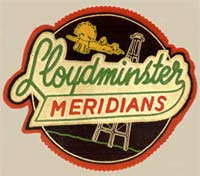 The Saskatchewan Baseball League
The Saskatchewan Baseball League
The Lloydminster Meridians, 1954. Finally, a team of our own.
They came from college, high school, the minor leagues, Cuba, California, Montana, Idaho, Illinois, and Canada (catcher Eddie Tanner from BC would become a fixture with the team). (A couple of players, Johnny Ford and Max Weekly, would be recruited to pour cement to finish the dugouts in time for opening day.)
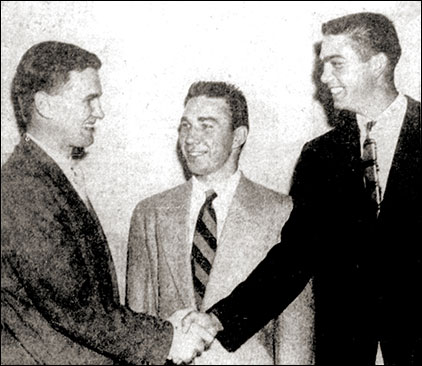
In a pre-season luncheon Ford (centre) and Weekly (right) were greeted by Ted Mitchell a director of the Lloydminster club.
The Crown Life baseball schedule (above) put the new Saskatchewan Baseball League on the same pages with the Major Leagues, the Northern League and the South Saskatchewan loop.
It was Lloydminster's first real taste of the semi-pro action. Other centres (such as North Battleford and Saskatoon) had long histories with semi-pro baseball and, especially, tournament ball.
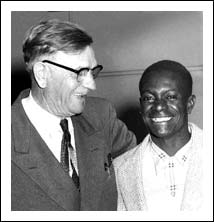 Left - Club executive Slim Thorpe welcomed Cuban recruit Roberto Zayas.
Left - Club executive Slim Thorpe welcomed Cuban recruit Roberto Zayas.
(Photo courtesy Lloydminster 2003, www.lloydminster.net)
Six teams lined up for the opening season: Saskatoon Gems (under Ralph Mabee as general manager), North Battleford Beavers (Jackie McLeod playing-manager), Rosetown Phillies (Benny Hill playing-manager), Indian Head Rockets (Jose "Hippy" Hernandez playing-manager), Moose Jaw Mallards (with football and baseball All-American Larry Isbell as manager -- see below) and the Meridians (with Bob Linck at the helm).
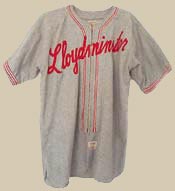 "Two sets of uniforms have been secured by the club; one pearl grey with red trimmings for the away-from-home games, with Lloydminster across the front, and for the games in the Legion Sportsman's Park they will wear white uniforms with a green strip on the front, of which will be Meridians." (Lloydminster Times)
"Two sets of uniforms have been secured by the club; one pearl grey with red trimmings for the away-from-home games, with Lloydminster across the front, and for the games in the Legion Sportsman's Park they will wear white uniforms with a green strip on the front, of which will be Meridians." (Lloydminster Times)
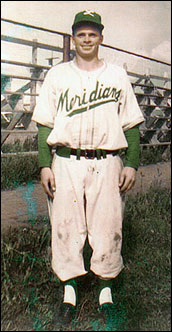
Left: Chuck McGuigan in the 1954 home uniform. Above : the road grey jersey.
Just about everything went wrong for the Meridians. The Lloydminster Times reported :
"Everything imaginable plagued the baseball club this past year. A freak automobile injury to the coach, bad weather, and the handicap of a smaller population to draw upon ...".
Bad things started early.
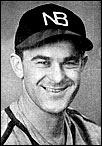 It was just weeks before the first game when Coach Bob Linck (right) was seriously hurt in a car crash.
It was just weeks before the first game when Coach Bob Linck (right) was seriously hurt in a car crash.
 In the opening game, May 19th, at Legion Sportsman's Park before about 800 fans, the Meridians were thumped 13-3 by the North Battleford Beavers. Lefty Max Weekly was pounded for 12 runs in just three innings of work. The Meridians made 10 errors. Only five of the regular starters were on hand for opening day. Five days later, Weekly would toss a two-hit shutout as the Meridians beat Rosetown Phillies (a "colored team" according to the Lloydminster Times) 2-0. Weekly struck out 10.
In the opening game, May 19th, at Legion Sportsman's Park before about 800 fans, the Meridians were thumped 13-3 by the North Battleford Beavers. Lefty Max Weekly was pounded for 12 runs in just three innings of work. The Meridians made 10 errors. Only five of the regular starters were on hand for opening day. Five days later, Weekly would toss a two-hit shutout as the Meridians beat Rosetown Phillies (a "colored team" according to the Lloydminster Times) 2-0. Weekly struck out 10.
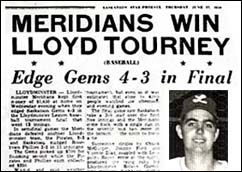 There was some sunshine, including a miracle ending as the Meridians won their own tournament and the $1,450 first prize. They beat Saskatoon 4-3 in 13 innings in the final. Weekly was the hero. He came on in relief in the 5th inning with one out and the bases loaded. He limited the Gems to just two hits the rest of the way. Meridians also won the Rosetown Tournament and were runners-up in the Saskatoon Exhibition event.
There was some sunshine, including a miracle ending as the Meridians won their own tournament and the $1,450 first prize. They beat Saskatoon 4-3 in 13 innings in the final. Weekly was the hero. He came on in relief in the 5th inning with one out and the bases loaded. He limited the Gems to just two hits the rest of the way. Meridians also won the Rosetown Tournament and were runners-up in the Saskatoon Exhibition event.
In the regular, rain-soaked, season Meridians finished dead last with just 22 wins in 60 games. Weekly was among the bright spots. He led the league in strikeouts with 103.
The financial situation wasn't any brighter than the final standings.. The club finished with a deficit of $12,427. Total revenues came to $14,343.50 with gate receipts accounting for $9,475 and tournament prize money adding $4,050. The summer's operations cost $26, 770.76.
The Times described the season as "an adventure in ball which was packed with high hopes, fraught with disappointments, plagued with poor weather, and hounded with financial reverses." In December, a Times headline announced there would be no team in 1955.
Saskatoon ran away with the regular season title finishing 11 1/2 games ahead of 2nd place North Battleford. But, in the playoffs, the Beavers won a controversial final.
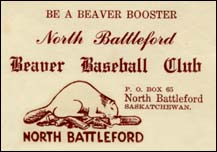 North Battleford had won the first game of the final series 5-4 in 13 innings. Saskatoon bounced back to win the 2nd game 3-2. However, the Beavers protested that the Gems had used an ineligible player. The protest was upheld and the game ordered replayed.
North Battleford had won the first game of the final series 5-4 in 13 innings. Saskatoon bounced back to win the 2nd game 3-2. However, the Beavers protested that the Gems had used an ineligible player. The protest was upheld and the game ordered replayed.
The Beavers won the next two to go up 3-0, but the Gems came back with three in a row before North Battleford took the deciding game 3-2. It was the Beavers' fourth consecutive Saskatchewan championship.
It was a season in which the Beavers fired Jackie McLeod as playing manager in July then convinced McLeod to rejoin the team for the playoffs. McLeod was the hero in the deciding game as he tossed a 7-hitter for the victory. In between, McLeod suited up with Moose Jaw at the Rosetown Tournament and beat the Beavers 5-4 in a first round game.
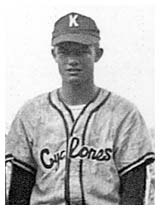
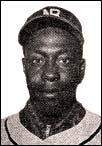 The '54 campaign also saw Curtis Tate (left) notch 10 runs batted in in a single game, Percy Trimont (bottom left) have a five-for-five day which included a homer and three triples, Max Weekly lead the league in strikeouts with 103, Ted Ellis, right (star of the Indian Head Tournament) claim three pitching wins on the same day.
The '54 campaign also saw Curtis Tate (left) notch 10 runs batted in in a single game, Percy Trimont (bottom left) have a five-for-five day which included a homer and three triples, Max Weekly lead the league in strikeouts with 103, Ted Ellis, right (star of the Indian Head Tournament) claim three pitching wins on the same day.
The summer also had Ted Wills come within one batter of a no-hitter, a player banished for a whole year for taking a swing at an umpire, Saskatoon play nine games in two days, Lloydminster pull off a hidden-ball trick so well even the umps missed it, the league president who quit with the parting worlds "They'll never get me in another mess like this.", a 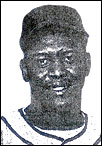 shortstop who made seven errors in one game, and rain, lots of rain.
shortstop who made seven errors in one game, and rain, lots of rain.
In a playoff game, Saskatoon pulled off a bases-loaded triple steal. Leopoldo Reyes scored from third, Jose Valladares moved to third and Ted Wills took second. Mario Herrera added three steals as the Gems had seven in total.
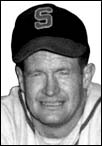 1954 marked the debut of one of the league's most colourful characters. But, in the beginning, nobody wanted him very much!
1954 marked the debut of one of the league's most colourful characters. But, in the beginning, nobody wanted him very much!
Cliff Pemberton had brought his family to Moose Jaw in July of '54 following a request from a friend that he join the team. However, when he arrived the manager made it clear he had no where to play the 'ol Redhead. He got into just two games for the Mallards before being loaned to Saskatoon.
Pemberton had a triple in his first at bat with the Gems and never looked back. He won three batting titles in his eight years in the league.
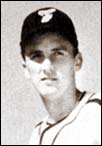
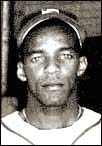
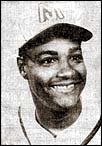 Ted Wills (far left),a pitcher-outfielder with Saskatoon, hit .336 to edge Moose Jaw's Collins Jones (right) for the batting title. On the mound, Sergio Fabre (near left) of the Indian Head Rockets went 10-0. Don Kirk of Saskatoon won 11 of 12 decisions in the regular season and tacked on two more wins in the playoffs. Wills, who won five games during the regular season, was superb in the playoffs with three complete game victories, including a one-hit shutout and a two-hit shutout.
Ted Wills (far left),a pitcher-outfielder with Saskatoon, hit .336 to edge Moose Jaw's Collins Jones (right) for the batting title. On the mound, Sergio Fabre (near left) of the Indian Head Rockets went 10-0. Don Kirk of Saskatoon won 11 of 12 decisions in the regular season and tacked on two more wins in the playoffs. Wills, who won five games during the regular season, was superb in the playoffs with three complete game victories, including a one-hit shutout and a two-hit shutout.
Reg Chopp of Moose Jaw was the lone Canadian to be selected to the All-Star team. Chopp, from Winnipeg, finished as the league's fifth best hitter.
c Bob Bennett, Sask; 1b Jesse Blackman/Blackmon NB; 2b Jose Valladares, Sask; 3b Curtis Tate, NB; ss Chico O'Farrill, NB; lf Collins Jones, MJ; cf Mario Herrera, Sask; rf Reg Chopp, MJ; p Ted Wills, Sask; p Bennie Griggs, Sask.
All-Stars selected to play against the Saskatoon Gems:
c Lou Green NB, Dick Loe MJ, 1b Reg Jackson RT, Jesse Blackman/Blackmon NB, 2b Art Stone NB, Chuck McGuigan Lloyd, 3b Johnny Ford Lloyd, Curtis Tate NB, ss Chico O'Farrill NB, Harold Johnson RT, lf Collin Jones MJ, Felton Morrison RT, cf Ken Nelson NB, Howard Warfield RT, rf Reg Chopp MJ, Roy Dean NB, p Ed Kapp NB, Max Weekly Lloyd, Boyd Brown RT, Jose Hernandez IH, Pancho Gray MJ.

 A new Southern League entry, the Moose Jaw Lakers, dominated the 1954 regular season campaign, finishing with a healthy six and a half game margin over the runner-up Weyburn Beavers.
A new Southern League entry, the Moose Jaw Lakers, dominated the 1954 regular season campaign, finishing with a healthy six and a half game margin over the runner-up Weyburn Beavers.
The Lakers' second baseman, Bob Chapman, (left) took the batting crown by collecting 41 safe blows in 110 official at-bats for a .372 average. His teammate, righthander Jack Devine, (right) boasted the best winning percentage on the hill by posting a 5 - 1 record for an .833 grading.
In an exciting best-of-five final, the fifth and deciding game delayed for 18 days with the advent of torrential rains and wet grounds, the Lakers capped a highly successful league debut by dumping the Beavers to take all the playoff marbles.
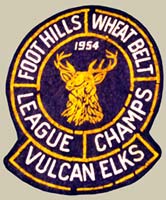 In Southern Alberta, the Vulcan Elks behind import lefty Jack Altman breezed to a 12-2 finish to win the pennant in the Foothills-Wheatbelt League. However, Granum walked off with the league title upsetting the Elks in the final round of the playoffs. Granum went on to win the Alberta title with a win over Edmonton. It was the first of a long string of successes by George Wesley's teams.
In Southern Alberta, the Vulcan Elks behind import lefty Jack Altman breezed to a 12-2 finish to win the pennant in the Foothills-Wheatbelt League. However, Granum walked off with the league title upsetting the Elks in the final round of the playoffs. Granum went on to win the Alberta title with a win over Edmonton. It was the first of a long string of successes by George Wesley's teams.
![]()

The regular season featured three no-hitters, by Altman, Willie Walasko and Bill Kucheran. There was offense too. On the final day of the regular schedule, Granum "shaded" Nanton 31-1.
In the two major Alberta tournaments, Spokane Builders won the Lethbridge Rotary event and Brooks Buffaloes won top prize at Lacombe.
Jack Altman : "Pete Beiden (Fresno State coach) arranged for us to come up to Vucan. We used to wait around with bated breath in the spring to find out if he was going to have openings for us. He called all the shots."
If it seemed as if Altman was always at the ballpark. And, it was pretty well the case. From February through to the end of November, the 19-year-old lefty played for seven teams compiling a 32-11 record in 365 1/3 innings. (See : Portrait of a Young Arm, 1954)
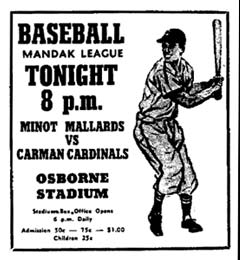 Minot Mallards were champions of the ManDak League for the third straight season. Mallards won the pennant during the regular schedule then beat Brandon in the playoff final.
Minot Mallards were champions of the ManDak League for the third straight season. Mallards won the pennant during the regular schedule then beat Brandon in the playoff final.
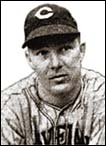 Former major leaguer Roy Weatherly (right) of Williston hit .412 to win the batting crown. Sugar Cain of Minot had the best pitching record, 11-1, and led in strikeouts with 98. Neil Lettau, also of Minot, had the most wins, 13.
Former major leaguer Roy Weatherly (right) of Williston hit .412 to win the batting crown. Sugar Cain of Minot had the best pitching record, 11-1, and led in strikeouts with 98. Neil Lettau, also of Minot, had the most wins, 13.
A three-homer day is rare. A three-homer day on your birthday? Don Stewart, who would be joining the Meridians in 1955, belted three homers and a single on July 11th, his 24th birthday, as Brandon defeated Carman 16-10 in a ManDak League contest. His wife-to-be was in the stands.
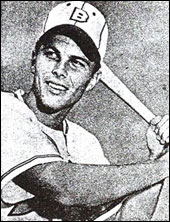 Moose Jaw's manager (at least for the first part of the season before football got underway) was Larry Isbell, an All-American quarterback in football (1951) and All-American catcher in baseball (1952) at Baylor University in Texas.
Moose Jaw's manager (at least for the first part of the season before football got underway) was Larry Isbell, an All-American quarterback in football (1951) and All-American catcher in baseball (1952) at Baylor University in Texas.
Isbell, who finished seventh in the voting for the Heisman Trophy in 1951, was the first draft pick of the Washington Redskins in 1952. Instead, he went into baseball, right to Triple-A with Louisville of the American Association where, in parts of two seasons, he hit .286 and .317.
In 1954, Isbell returned to football with the Saskatchewan Roughriders and carved out an all-star career as a pass receiver, defensive back and punter (left-footed). Isbell, a member of Regina's Plaza of Honour, was inducted into the Texas Sports Hall of Fame in February, 2001.
 Jack Hannah, was among the first wave of California kids from to trek to the Canadian prairies for a summer season. Hannah, still in high school, suited up with Roy Taylor's Saskatoon 55s in 1951 and in '54 had a summer of ball with Marshall in the Western Minny League.
Jack Hannah, was among the first wave of California kids from to trek to the Canadian prairies for a summer season. Hannah, still in high school, suited up with Roy Taylor's Saskatoon 55s in 1951 and in '54 had a summer of ball with Marshall in the Western Minny League.
" ... When Jack Hannah arrived in Marshall for the 1954 Western Minny League season, he attained almost instant celebrity. Marshall always treated their college baseball visitors special, but the Fresno State right-hander offered a little extra to the southwestern Minnesota town. “He took the town by storm,” Minnesota baseball legend Jerry Kindall said. “He was a tall, blonde, blue-eyed guy from California . . . a heart throb, but he certainly wasn’t a hot dog. While he never reached the big leagues, he did make it to AAA professional ball, and he became an outstanding high school coach.” Hannah went 6-1 for Marshall in 1954, with a 3.86 ERA. He combined with Ohio State All American Paul Ebert, who went 8-4, to form a potent starting duo ... The Marshall Baseball Association paid Hannah $250 per month to take care of Legion Field." (From Glory Days, a history of amateur baseball in Minnesota)
The Modesto Bee (Feburary 16) reported the Modesto Bees had given up hope of obtaining Satchel Paige, but have been receiving letters from numerous others willing to fill in.
“Among them is one signed by Pancho Gray of New York. He says he is in his late 20s, has won between 500 and 600 games, bats around .300 and promises, with the aid of a companion to win 60 games for Modesto this year if given a chance … I am better than Paige is now although he was pitching before I was born. I have won 65 games against good sandlot and minor league teams, all around New York State, in a season … I have been playing up in Canada for four years and all over the United States. I am good enough for the majors but I haven’t gotten a break yet … I am in my late 20s, six feet tall, weight 180, throw from the right side.”
